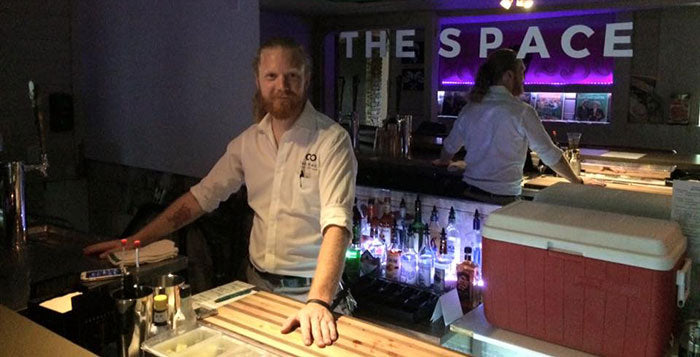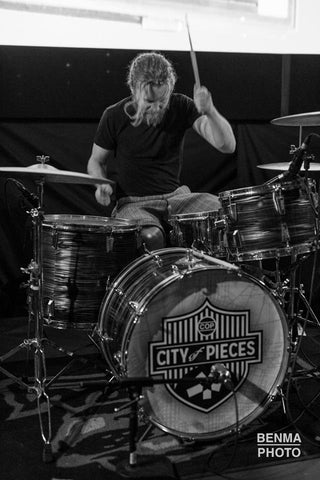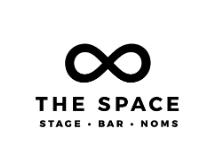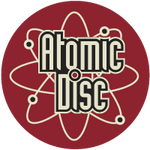Have you ever wondered what club owners are really looking for when booking bands?
We had the pleasure of talking to Doug Hoffman, co-owner of Salem club, the Space, about booking shows, running a club, building a music scene, merch tables and what makes a successful show.

Doug, a drummer since the age 8 is also a Full Sail alumni. After graduating from Full Sail he returned to his hometown of Salem Oregon, knowing that he wanted to create a venue. He booked his very first show in an alley next to Salem's legendary Guitar Castle with the city's approval for temporary blockage.
What made you want to start your own club?
During my career with the band The Widgets we played hundreds of shows. There was one in particular I remember where a young person was inspired to play the drums after watching my group. THAT WAS IT. Since then hoping to inspire people through live performance has been my mission. Recreating the best environment to have this idea perpetuate is my favorite thing. Even if only a few people see the world differently because of music they wouldn't have otherwise witnessed, I feel that I am making a difference. That isn't necessarily the best for a bottom line business mind, but it is the impetus for the venue idea. It's a long term learning experience and a project that is ever-evolving.
What are you looking for when booking bands?
Primarily when I book an act for the first time I am looking for a clean presentation of an aesthetic. A character or even mythos of the band to immerse people in. Paramount is a good looking website (even Bandcamp is very useful for this), a sound that I can identify as having heart, and some description of what kind of music the band or act describe themselves as. Even if I don't totally see myself being a huge fan, I attempt to follow what the band is presenting or making music for. Social media is super helpful for seeing what that band is currently up to and for photographs of them in action. It's useful for cross-promotion and poster material. Estimating the draw can be better guessed with members' popularity and longevity in the local scene, a view of the band's social media, BUT IT DOESN'T GUARANTEE A DRAW. In fact as of yet in my opinion I haven't witnessed a way to know how many folks are going to be at any given show. It's like predicting an earthquake or other natural phenomenon: we have clues and indicators but you just don't know until the show is happening.
What are the most important things a band / artist should do to prepare for booking club shows?
Being well rehearsed, having a distinct look (both online and in person) and sound, and the band's own promotion to their social circle is highly useful and reinforces the chances of being booked again and for an expanding audience. I also have a rough rule of the 3-peat. If a band and venue are working well, by the third show a group has in a new market (city) they would hopefully have a more reliable turnout. Finally, having a stage plot for how the group likes to be set up is really useful (this is an overhead drawing with basic geometric shapes showing the stage layout of the group and their gear during performance).
Useful tips:
- If booking outside your local scene: Reach out to local acts that would be a good match and try to book shows together or piggyback off their show.
- Look at what else is going on in the area on the same date as your show. Plan accordingly by tapping into alternate social groups.
- Themed nights are fun and create a reason for people to come out.
- It is important for bands to promote their show to their social circle.
- Posters. Make sure the COST, DATE, TIME, LOCATION, and ACT NAMES are clear and pronounced.
How far in advance should they book?
The best for me right now is about 3 to 4 months out for booking the main band of a night. It gives both parties the opportunity to help hunt for local groups that would match the sound and work along other events that may be happening the same night. Now don't get me wrong, I've booked last minute tours and locals alike that need a spot to pull off and play or pick up a show that fell through. It's pretty case by case, but I always error on the side of my gut. Music festivals I have thrown on the other hand I tend to start booking and organizing 8 months or even a year out.
What form of contact do you prefer? Email? Facebook? Phone?
For me the best contact method is email. This is a really clear and direct way of asking about a show without the bulk and distraction of social media sites. However I do deal over messenger services frequently but rarely do I "Confirm" shows this way. An email thread is simpler. Also details in regard to the upcoming booking can be discussed, links to the band's online elements delivered, and any other details finalized. Additionally, the actual word "Confirmed" is important. It denotes that when all parties involved correspond with this terminology, the date is active and may be promoted to the public. Promotion before this can sometimes prove shitty.
Do they need a presskit? Electronic or hard copy? Does video help?
A press kit is still a viable resource, in either electronic or hard copy. It shows that the group is dedicated to making something happen. In 2016 however I do find that an EPK (Electronic Press Kit) is more efficient for viewing and moving to the next step. Again a clean looking representation of the band in an online form or through recorded physical media is really helpful - video, preferably live footage, is also a really useful tool for a number of reasons. As a venue it's good to see what the band's stage dynamic is like, a quick view of the number of members, the sort of gear that is in use, and other details that various booking folks might want to know.
Do you prefer working with booking agents / agencies?
It completely depends. Sometimes working with agencies can be harder because of the lack of direct communication with the band themselves. An advantage of working with an agency is that they typically represent acts that are professionally experienced. They understand some frequent terminology and can roll with punches more easily (TYPICALLY).
That being said, I absolutely love working with bands who are booking their own tour and/or dates. These bands in my experience tend to be "hungrier" for the audience and opportunity to perform. Some of the most show-stopping bands I've ever witnessed are on their first unrepresented tour and completely smash it. Also there is something special about helping these newer groups along and giving them the opportunity to play. Something like, "Remember that band that one time? Wow! I was there!"
Are guarantees or playing for the door more likely?
At this point, with The Space at least, door deals are more likely. The main advantage for the club when having a door charge is that it encourages the artist to promote the show to earn their pay. It's in everyone's best interest. With guarantees (that DO actually work well sometimes), I find that there is a chance the artist being guaranteed won't feel the need to push as hard because the payout is a promised amount. In these cases implementing some basic agreement stating that everyone will agree to promote and sell the show in a certain timeline at a certain frequency in a certain outlet is key.
More established and/or experienced groups have often budgeted almost to the cent what they need to make the tour stop worth it for them. Sometimes they may even be taking a loss after the tour is finished (this is the case many times). In these instances working on a guarantee basis might be necessary. Specifics of any guaranteed amount and responsibilities of both the venue and artist are important to outline in these situations. A typical piece of this dealing for artists with representation is what's called an "Offer Sheet". It is a fill in the blank form that is provided by the representing agency to outline what the venue is willing to provide for the artist's performance. This form would be best if it also outlined the venue's expectations of the artist as far as promotion, set time, set length, and any other pertinent agreements between the parties.
In your opinion, how important is merch sales for bands?
"If you give a really fantastic performance every show you should only need a merch table," is a quote that crossed my mind a while back. Its not totally accurate but its not far off. I've seen groups play on a Thursday night with no local support except the venue draw which wasn't too many yet. Everyone rushed the band's merch table after the performance, buying CDs and everything in sight and sending the band on their way with praise, a descent amount of cash, and best of all - a memorable experience. Now we have the tale to tell about this amazing band and the T-shirts to wear that are passive promotions for them when they return.
How should artists interact with the club staff to make a good impression and make it more likely that they will be asked to come back?
Basically following all of the rules set by the club in advance dealings is the best way. Any rules a venue / restaurant / bar has are in place for a reason. As a band / artist, you are working from the moment you set foot in the club. This is where bands are making impressions, conducting themselves in a way that will reflect on the band's brand. Respecting others' jobs and their environment is key in creating and maintaining a working relationship.
What do you consider a successful show?
To me every show is a successful show. Primarily if even one person looks at the world a bit differently because of the environment they've spent their evening in and the music they've witnessed I feel it has been a success. Every show is a learning experience. If the bottom line isn't there that can be an issue, but ultimately there are currencies more important than money. Through learning what works and what doesn't work as a venue or as a band, I believe one can create an emotive force that also sustains itself and is true.
Art Leads Society.
And last but not least, what is your favorite beverage?
Water, coffee, purple sports drink, beer, bloody Mary - in that order.

http://www.spaceconcertclub.com
To book shows at the Space:
http://www.spaceconcertclub.com/booking

I disagree with a lot of this article. To address the " email contact" thing, most owners/ GM’S/ managers NEVER EVEN OPEN EMAILS THEY DONT RECOGNIZE. They certainly dont return calls nor emails. That is a myth. A lot of venues try to rely on " how many folowers do you have". Another misconception. I have 700 on my Facebook band page. I put out my events, THEY HARDLY SHOW UP. Not my fault. In my mind, some owners are just too lazy to promote their OWN venue. Inly thing some push is food and maybe drinks. On occasion a theme night. Big deal. It was a time when clubs or bars were JUST PLAIN POPULAR WITH THE PUBLIC AT LARGE. No need of you bringing all the folks in. They come anyway cause they dig your spot. A lot of them also go with this " talent agency" crap. These agencies often have bands who just plain suck. They only are concerned wiyh keeping the merry go round turning for their acts in the stable. They flood clubs with the same old crap. Every band damn near the same. Respecfully, white boy reggae/ ska is what i see lot. They dont even play a true reggae feel. Im being real man. They clubs will tell you quick, " WE ONLY USE AN AGENCY". Independent acts are where its at. These " agents" are just pimps in disguise. Eventually patrons do catch on and get tired of the same old and start to come out less and less. Me? I like going and having a sit down with management. Look them in the eye. Get a feel for them and they me. Set up auditions outside any agency. Usually when they being the owners hear and see my act, Im hired on the spot. And for good period of months at that. Its all gone to crap out there.
Great article and tips! One thing that new bands seem to underestimate is professionalism. Having a polished sound and look AND being able to be realistic are huge factors. Wait until you sell a million records before you consider yourself a “rockstar”.